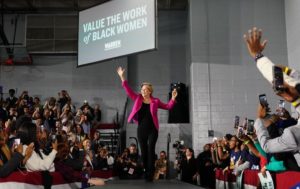Deina
Warren gets it. Love, women, and intersectionality.
February 24, 2020‘I love my country, I love it very much. It is for that reason I do not makes excuses for it. If we think installing a hero is going to solve our problems, here is my warning now.
It won’t.
We NEED to BE the hero we seek in elected officials. Or else round and round we go.’
~Deina @sapereaude86
‘Political discourse is my Assignment. America is my Station. Love is my Religion’
‘Throughout her campaign, Warren has shown her ability to use intersectional approaches to analyze a wide variety of social ills & her engagement with this paradigm has only gotten richer as her campaign has progressed.’ By far, the best candidate for president.
Elizabeth Warren Is Running an Unapologetically Intersectional Campaign
As much as I want Medicare for All and for the rich to pay higher taxes, that won’t cure sexism. Warren gets that.
Another lesson of intersectionality has to do less with analysis and theory than with what we may call a politics of respectful attention. Taking intersectionality seriously means moving beyond merely acknowledging one’s own privilege and understanding that walking the walk entails listening to and learning from those who live in identities different from your own. Warren has exhibited this repeatedly, chiding other Democrats for only engaging with the black community during election time. Conversely, she met with Ta-Nehisi Coates—years before she became a presidential candidate—to learn from him following his explosive writing on reparations.
As Nelini Stamp writes in the newly radical Teen Vogue, “Elizabeth Warren is paying attention…. Her [environmental justice] plan is informed by the 17 Principles of Environmental Justice, an equity-based framework written by activists of color in 1991 that no presidential administration has acted on to date. Not anymore. Warren centers marginalized communities again and again in her plan.” And when Warren reads off the names of murdered trans women (not at a LGBTQ event!) and pledges to do so every year in the Rose Garden, she “brings the margin to the center” as bell hooks put it, making visible the ways in which race, class, gender, sexuality live in particular bodies in particular ways.
Being intersectional also means having to own up to mistakes, learn from those who live and love differently from you, step aside when necessary and step up when the situation dictates it. At a presidential forum on Native American issues in August, Warren addressed her own errors. “Like anyone who’s being honest with themselves, I know that I have made mistakes,” said Warren, presumably referring to her release of a DNA test purporting to show that she had Native American ancestry. “I am sorry for harm I have caused. I have listened and I have learned a lot, and I am grateful for the many conversations that we’ve had together.”
The key to robust intersectional thinking is to concretely demonstrate the ways in which things that seem to be about one concern are often inflected through others.
§ As Warren herself said in a tweet outlining her disability rights platform, “All policy issues are disability policy issues, which is why I’ve approached many of my previous plans with a disability rights lens, from criminal justice reform to ensuring a high-quality public education for all, to strengthening our democracy.”
§ When Warren addresses the debate about guns and links it to domestic violence, she is signifying precisely how a different angle of vision illuminates the connection between a culture of unfettered access to guns and a culture of violence against women.
§ During the New Hampshire debate, as the candidates discussed racial inequities in criminal justice and in wealth acquisition, Warren pointed out how her proposal to levy a wealth tax is not a simple “class” issue but in fact would address racial inequality in substantive ways by, for example, getting rid of student debt that unduly burdens people of color, who tend to be more in debt and take longer to pay it back.
§ On abortion, Warren made sure to point out the class and race dimensions, stating that if Roe v. Wade gets overturned, the rich (who are largely white) will continue to have access to reproductive services, while poor women and women of color will suffer.
§ She pivoted to condemn our history of discriminatory housing practices and make the point about the various ways in which racism informs pretty much everything, insisting that we can’t relegate “race” questions to some narrow aperture of vision.
§ In her plan on “Valuing the Work of Women of Color” (yes, she actually has a plan for that—a claim no other candidate can make), Warren acknowledges how the interplay of sexual and gender identities (as well as ability) with racial identities can exacerbate the obstacles women of color face.
§ In her plan on securing LGBTQ equality she highlights the connections between LGBTQ oppression and homelessness and increased risk of incarceration.
§ When discussing how to honor and empower Native people, she points out the centrality of anti-violence work for indigenous women who often go unprotected due to conflicts of tribal and federal governance.
[full read]
https://www.thenation.com/article/politics/elizabeth-warren-intersectional-campaign/
In lieu of SNL debate recap. #TikTok
https://t.co/eUMOKQ2xcEhttps://twitter.com/theferocity/status/1231936042346983424?s=20
